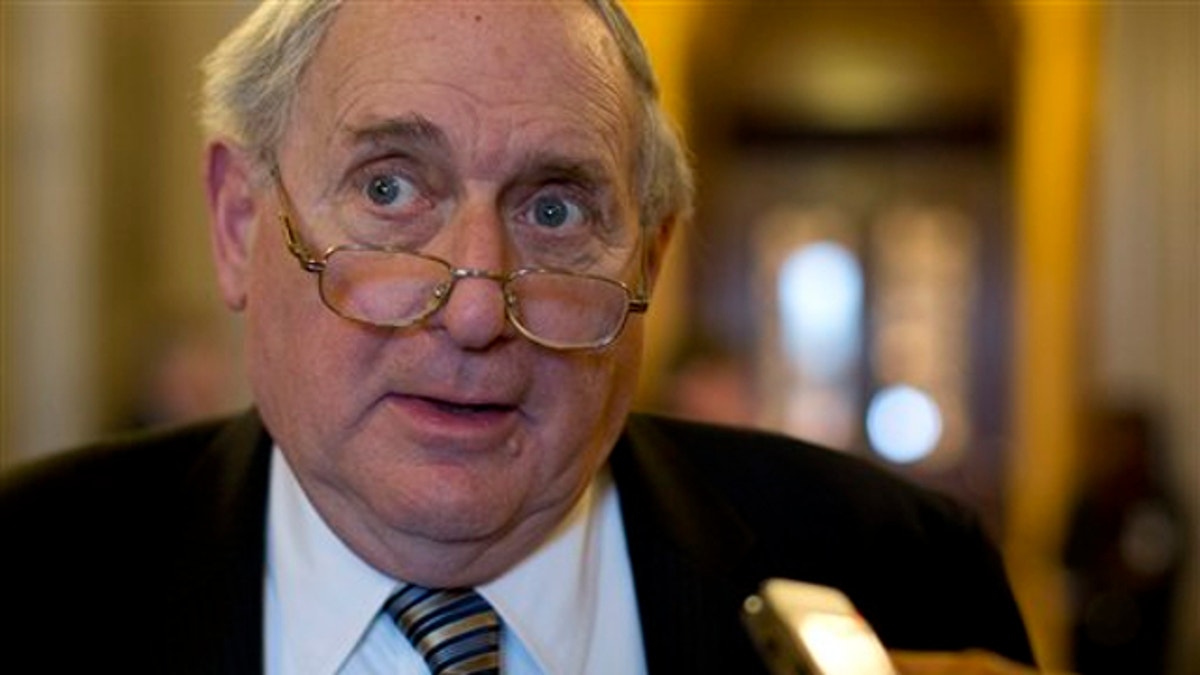
Feb. 26, 2013: Senate Armed Services Committee Chairman Sen. Carl Levin, D-Mich. speaks with reporters on Capitol Hill in Washington. (AP)
WASHINGTON – Democratic Sen. Carl Levin announced Thursday he will not seek re-election in 2014, saying he wants to serve as Senate Armed Services chairman and an advocate for his home state of Michigan "without the distraction of campaigning for re-election."
Levin, 78, was first elected to the Senate in 1978 and is the longest-serving senator in Michigan's history. He said in a statement that he struggled to make a decision along with his wife, Barbara, calling it "extremely difficult because I love representing the people of Michigan" and "fighting for the things that I believe are important for them."
Levin is the sixth member of the Senate to announce his retirement, creating an open seat for Democrats in a state that has backed President Barack Obama twice but where Republicans hold the governor's office. Democrats, who control 55 seats in the Senate, have to defend open seats in West Virginia, Iowa and New Jersey in the aftermath of three other retirements and will try to hold onto 21 seats in next year's elections.
The last time Michigan had an open Senate seat was in 1994 and Levin's retirement could create a large field of potential successors. Rep. Gary Peters, a Democrat who represents suburban Detroit, has been viewed as a potential Senate candidate, while several Republicans could pursue the race. Potential GOP candidates include Reps. Mike Rogers and Justin Amash, Lt. Gov. Brian Calley and Attorney General Bill Schuette.
The senator had won re-election handily in recent years and was considered a safe bet to hold onto the seat if he had sought another term.
"No one has worked harder to bring manufacturing jobs back to our shores, close unfair tax loopholes, and ensure that everyone plays by the same set of rules," Obama said in a statement. "As chairman of the Armed Services Committee, Sen. Levin is a true champion for all those who serve, and his tireless work will be missed not just in his home state of Michigan, but by military families across our country."
Levin, who often presents a slightly rumpled, down-to-earth demeanor, is the younger brother of Rep. Sander Levin, D-Mich., and the senator's retirement will end one of the longest-serving tenures of siblings in Congress. The brothers were roommates at Harvard Law School in the 1950s, and when Sander Levin first sought political office, Carl served as his campaign manager. The congressman has said he intends to seek re-election.
Levin's announcement comes just days after he shepherded Defense Secretary Chuck Hagel's nomination through a bruising Senate confirmation fight. The Armed Services chairman often found himself at odds with some of the newer Republicans on the committee, including freshman Sen. Ted Cruz of Texas. Levin pointedly pushed back when Cruz insinuated that Hagel had taken money from extreme or radical groups, and he defended the president's nominee.
Levin, who has served on the committee for nearly three decades, became chairman in 2007 after Democrats regained the majority in the Senate. He has worked closely with Sen. John McCain of Arizona, then the top GOP committee member, in ensuring that the Congress produces an annual defense policy bill, which it has done for more than half a century. The panel is one of the few committees to successfully produce a bipartisan authorization bill.
Levin clashed with the Obama administration in 2011 over provisions in the bill on the handling of terror suspects and detention policy, but ultimately prevailed in establishing various policies.
Closer to home, Levin has been an outspoken advocate for his home state auto industry and manufacturers. When General Motors and Chrysler faced potential collapse in 2008, Levin pressed his fellow members and the incoming Obama administration to support the companies with billions of dollars in loans. The automakers have since rebounded.
Levin also has kept a keen eye on financial matters. As chairman of the investigations subcommittee, Levin in 2002 led a probe of the activities of Enron Corp., which had declared bankruptcy the previous year amid illegal accounting methods and other financial irregularities. The investigation resulted in legislation meant to improve the accuracy and reliability of corporate disclosures.
Levin also has sought to crack down on offshore tax havens, which he said cost the U.S. government at least $100 billion a year in lost revenues.




